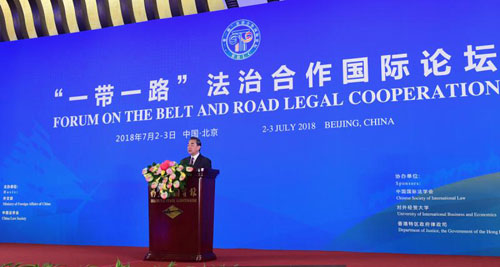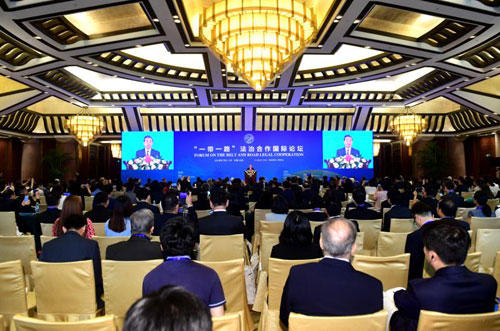
Diaoyutai State Guesthouse, 2 July 2018
Mr. Chair of the Forum,
Distinguished Guests,
Ladies and Gentlemen,
Good morning! First of all, on behalf of the Chinese government, I warmly welcome all of you to Beijing for the Forum on the Belt and Road Legal Cooperation.
In 2013, President Xi Jinping put forward the Belt and Road Initiative (BRI) based on a keen understanding of the broad trends of development in China and the world. It is a major initiative for international cooperation that aims to promote the common development and prosperity of different countries and the building of a community with a shared future for mankind.
Over the past five years, guided by the Silk Road spirit of peace and cooperation, openness and inclusiveness, mutual learning and mutual benefit, the BRI has been committed to promoting common development. It has received support from around the globe and produced fruitful early harvests. So far, nearly 90 countries and international organizations have signed BRI cooperation agreements with China. Under the BRI, 75 economic cooperation zones have been set up in the participating countries, and steady progress has been made in industrial capacity cooperation, connectivity and building economic corridors. China’s trade with BRI participating countries has reached above RMB 30 trillion and investment in these countries over US$70 billion, creating more than 200,000 local jobs. More and more countries and their people are benefiting from this initiative. The BRI has become the largest platform for international cooperation and the most popular public good in the world. Last year, the first Belt and Road Forum for International Cooperation (BRF) was successfully held in Beijing, which produced more than 270 deliverables and marked a new stage of BRI’s full implementation. In response to the call of a number of countries, China will host the second BRF next year. All parties are welcome to take an active part.
What are the reasons behind the BRI’s wide endorsement and better-than-expected achievements within a relatively short period of time?
First, Belt and Road cooperation follows the principle of equality and mutual benefit. The BRI is an international cooperation platform that sets a good example. It is a Chinese initiative, but all parties are equal participants, contributors and beneficiaries. On this new type of platform, countries cooperate as equals and pursue shared development through consultation and collaboration.
Second, Belt and Road cooperation aims for win-win outcome. Since day one, the BRI has been committed to the common development and prosperity of all participating parties. It works to make economic globalization more inclusive and beneficial for all, and meets countries’ aspiration for win-win cooperation. The BRI is not China’s solo performance, but a symphony played by all. It does not benefit just one party, everyone stands to gain.
Third, Belt and Road cooperation is open and inclusive. The BRI is totally transparent. It is not an exclusive club, but an open space for friends. Any party that subscribes to the Silk Road spirit is welcome to join and share its opportunities. We hope that all BRI projects are of high standard and high quality. We lay great emphasis on green development, environmental protection and debt sustainability. We are aware of the importance of heeding the realities of different host countries and accommodating their actual need.
Fourth, Belt and Road cooperation is advanced by synergizing development strategies. Over the past five years, the BRI has forged greater synergy with other development strategies at the national and regional levels, including the Eurasian Economic Union of Russia and other countries, the Bright Road initiative of Kazakhstan, the Development Road initiative of Mongolia, the Global Maritime Fulcrum vision of Indonesia, the Investment Plan for Europe and the UN 2030 Agenda for Sustainable Development. Such different types of alignment at various levels have enabled complementarity of strengths, unlocked more potential and broader space for cooperation, and helped to address unbalanced development and fragmentation of international cooperation. The ultimate goal is to boost interconnected development and achieve shared prosperity.
Fifth, Belt and Road cooperation is based on rules and the rule of law. Our cooperation has always been conducted within the confines of international rules and law, observing both international law and the domestic laws of host countries. We are expediting the negotiation of agreements on trade and investment, finance and taxation, IPR, transport, environmental protection and other matters, with a view to establishing a rules-based legal network for BRI cooperation. We believe, rules and rule of law are essential for BRI to develop in the world. They are also the safety valve against uncertainties and challenges.
Ladies and Gentlemen,
The BRI calls for concerted efforts among all participating countries, not least the contribution from the legal community. China would like to strengthen legal cooperation with all parties involved so as to provide more solid legal and institutional safeguard for Belt and Road cooperation.
First, we need to harmonize rules and regulations under the BRI. China has basically brought domestic rules and standards in line with international ones. We have joined almost all universal inter-governmental organizations and acceded to over 500 international conventions. By 2017, the correlation rate between China’s national standards and international ones was already over 90%. While promoting “hard connectivity” of infrastructure, it is equally important to strengthen “soft connectivity” of policies, rules, standards and institutions among countries, so that different rules and standards can be compatible. Such an unimpeded “expressway of rules” will help to fully unleash the positive impact of connectivity under the BRI.
Second, we need to improve the legal safeguard for the BRI. We should fill in the gaps without delay, update treaties where necessary and build a network of treaties that meets the need of Belt and Road cooperation. It is imperative to put in place a Belt and Road dispute settlement mechanism that integrates litigation, arbitration and mediation services to properly resolve disputes and create a law-based business environment. We should also establish a Belt and Road legal information sharing and big data service platform to provide better legal counseling for Belt and Road cooperation. The Chinese Foreign Ministry is setting up a national treaty database. Once completed, it will be much more convenient for businesses and the general public of BRI participating countries to look up treaty information.
Third, we need to deepen Belt and Road legal exchanges and cooperation. China supports more legal exchanges between the governments of BRI participating countries, international organizations, the private sectors and the academia so that they can learn about different legal cultures, share experience and best practices and work together to forestall legal risks. We hope to see stronger judicial and law enforcement cooperation among participating countries, and would like to work together with other countries to combat transnational crimes and advance international anti-corruption cooperation. We also hope to see greater capacity for the rule of law and more international legal experts in BRI participating countries. I hereby announce the Chinese government’s decision to fund the “Belt and Road Legal Cooperation Research and Training Program” to boost such cooperation.
Ladies and Gentlemen,
This year marks the 40th anniversary of China’s reform and opening-up. Going forward, China will stay committed to the fundamental policy of opening-up while pursuing greater development. We will continue to advance the Belt and Road international cooperation guided by the principles of extensive consultation, joint contribution and shared benefits, and work hard for achieving policy, infrastructure, trade, financial and people-to-people connectivity.
The BRI comes from China but its opportunities and achievements are for the world to share. As President Xi Jinping said at the first BRF, “the BRI is a great undertaking which requires dedicated efforts. Let us pursue this initiative step by step and deliver outcome one by one. By doing so, we will bring true benefit to both the world and all our people.” Let us join hands to strengthen cooperation in the legal and other fields for greater progress under the BRI. Let us contribute to the building of a community with a shared future for mankind and to an open, inclusive, clean and beautiful world that will enjoy lasting peace, universal security and common prosperity.
To conclude, I wish the forum a complete success.
Thank you.

